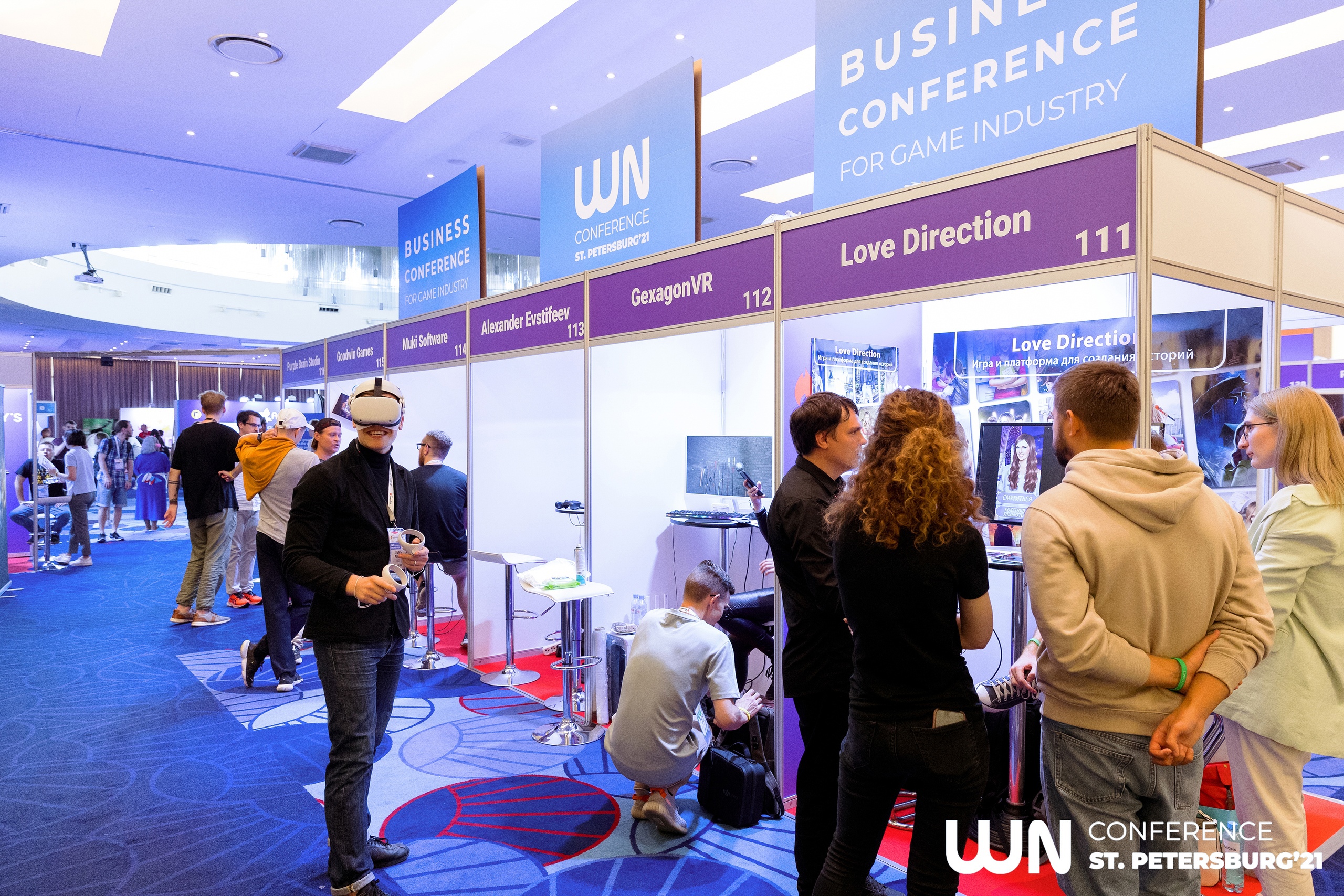The showcase at the conference is one of the most accessible tools for promoting games. About the specifics of participating in it, — we talked with experienced developers in the light of the upcoming WN Moscow’21 (she is collecting applications from developers until Friday).
What is a showcase?
Just in case, let’s start with the terminology.
A showcase is a synonym for an exhibition. In our case, it is an exhibition of developers and their games. We say “showcase”, we keep in mind “developer exhibition”.
What is the use of a showcase?
One of the most obvious answers is that the showcase can be a springboard for commercial growth. At gaming conferences, in which exhibitions are usually held, investors and publishers always carefully study the exposition. If they like the project, they can offer to work together. But this, of course, is not the only benefit of participating in showcases.
Andrey Harutyunyan, co-founder of Ellada Games (Niffelheim) and Colibri Games (The Tiny Bang Story)
For novice teams, it is a way to make themselves known to other developers and publishers, as well as an opportunity to find development partners and employees, meet publishers or investors.
Sergey Kopov, Founder of 0xGames and Sunday Games
If you have a product and you need help to make it successful (that is, to get investment, feedback or connect a particular service), then the best way to find it is to take part in a showcase.
Philip Karmanov, CEO and Founder of Black Snowflake Games
The main benefit of showcases is to collect feedback and establish links with other companies. This is especially true for novice teams.
Kesha Skirnevsky, founder and owner of Zebrainy (“Skazbuka”).
A showcase is one of the ways to get a huge feedback from different specialists in one day.
During the development process, the team always falls into the trap of its own vision. The longer you work on a solution, the more it seems that it is the right one, the only right one. Showcases help to get out of this trap a little.
Dmitry Kachkov, Head of Sobaka Studio (Redeemer, 9 Monkeys of Shaolin)
For myself, I have identified three useful points that provide showcases.
1) Enlightenment
A showcase can push you to realize the fact that the game is really shit. I don’t want to offend anyone, but developers are almost always (in fact, always) under the illusion about their product. What seems obvious to them, in fact, turns out to be not at all obvious to the players. The realization of this can cause shock.
2) Policing
90% of the time working on the game is spent on the development of “features”. Unfortunately, due time is usually not allocated for their connection together. The developers believe that all implemented mechanics by default will work perfectly together.
Of course, this is not the case. In the assembly of the first versions, something will necessarily break (including what worked fine before). And the showcase is something like stress testing.
Watching this even turned into a fun entertainment for me. At each showcase, I wonder what will “fall off” in the game this time.
3) Energy pump
The showcase is energizing when you see that the game works and people like it.
There are also pitfalls here. There are polite players who, instead of saying that “the game is shit,” politely say “cool, cool, a little twist — and there will be a bomb.” Such feedback can lead to a false trail.
Alexander Khoroshavin, indie developer (Algotica Iterations, Mechanism, Selfloss, Maru)
Showcases give two of the strongest profits for any developer.
The first one is obvious: exhibitions allow you to see the reaction of a living person (no matter, an ordinary player or a professional from the industry) to the game. Thanks to this, you can understand what is cool in the game, and what needs to be fixed.
The second profit: showcases provide psychological therapy. I’m talking about the feeling that you feel when you see that YOUR project is being watched, discussed, questioned about it. It seems to me that this is why most developers are engaged in games. They want their creations to be noticed, to be played and talked about.
What did you achieve at the showcases?
Andrey Harutyunyan, co-founder of Ellada Games (Niffelheim) and Colibri Games (The Tiny Bang Story)
We have extensive experience in participating in conferences and exhibitions (both in b2b and b2c).
During the showcases, we have repeatedly received valuable feedback on the game. At one of the exhibitions — shortly before the release — a moment requiring correction was discovered. We managed to fix it.
Also at one of the showcases we got acquainted with the influencers who played our game at the release.
Sergey Kopov, Founder of 0xGames and Sunday Games
I have been participating in showcases since 2015. From each event, it invariably turns out to make one or another benefit.
The most successful meeting took place in 2017. Then I met my future partner. He pushed me to completely switch from self-employment to self-development
Philip Karmanov, CEO and Founder of Black Snowflake Games
The first time I participated in a game dev conference with a showcase was in 2014, when I was a 17-year-old schoolboy who had seen game dev only on the Internet for seven years before. Of course, that showcase brought a flurry of positive emotions.
If we talk about the benefits, then later, just at one of the showcases, we found a publisher, one of the major players in the Russian market. Moreover, his representative came for us two conferences in a row.
After the showcases, we discussed the plan for further work for quite a long time and made some commits. The deal did not take place in the end (we were not satisfied with the sharp deterioration of the conditions on the eve of the conclusion of the contract), but for me it was a tremendous experience.
Kesha Skirnevsky, founder and owner of Zebrainy (“Skazbuka”).
I remember the first participation the most. There we saw that a very large number of people like the game. This gave me the strength not to give up before the release. And, of course, it gave a lot of feedback.
Dmitry Kachkov, Head of Sobaka Studio (Redeemer, 9 Monkeys of Shaolin)
It is very important for us to catch the target audience at the showcases.
Our first exhibition was in Boston at PAX. There, the fiercest fans of action games came to our game, who wildly burned out of the game.
It was cool to give interviews, and then read articles with the experience of one or another journalist and comments left on social networks by players.
When we went to GDC, our game was played by the designer of the God of War combat system. However, it didn’t bring any manna from heaven: he played, we talked and he went on. But the fact itself is quite pleasant.
Alexander Khoroshavin, indie developer (Algotica Iterations, Mechanism, Selfloss, Maru)
Showcases almost always give a very positive experience. They charge with motivation, stimulate further work on the game. Every time after the exhibition, I rush to my work computer to immerse myself in development.
During almost any exhibition, you get a lot of good little recommendations. A couple of times I received very powerful advice on game design.
It’s important to keep in mind: there are a type of problems in game design that you feel but can’t solve. At such moments, a look from the outside (perhaps even in a drunken state) can open your eyes to some fundamental jamb.
What advice can you give on working at the showcase?
Andrey Harutyunyan, co-founder of Ellada Games (Niffelheim) and Colibri Games (The Tiny Bang Story)
To participate in the exhibition, it is important that you have:
- a good playable build;
- good mood;
- willingness to show the game and talk about it;
- business cards on the table and in your hands;
- handouts (we had stickers coming in).
Don’t be afraid to stop people passing by and tell them about the game. The task at the showcase is to have your game constantly played. It’s good if there are several of you on the showcase (2-3 people). In this case, you can replace each other.
Yes, be sure to write down all the ideas and feedback in order to work with it in the future already in working mode.
Sergey Kopov, Founder of 0xGames and Sunday Games
If playtests are not the main thing for you, then it is enough to install a screen (from 20 inches) and run a catchy video of your project on it.
It is not necessary to let them play at all — most do not want to waste time on this.
Make your own unique merch and give it to those who liked your game and who can be useful to you (it is important for us that they remember about the project after the event).
Philip Karmanov, CEO and Founder of Black Snowflake Games
If the main goal of the showcase is to get feedback on the game in development, then it is worth taking care that the person who came to your stand could immerse himself in the gameplay.
The ideal solution is to prepare a special build that allows you to immediately get involved in the gameplay, bypassing the screensavers, settings menu and so on. If it is most convenient to play with a joystick, give the visitors of the showcase this opportunity.
I advise you to interfere as little as possible in the gameplay of visitors. This is especially true for consumer events where visitors are not industry professionals. If players often ask what to do in the game, this is a reason to think about UX.
Properly selected merch can greatly increase memorability. We often went out on it. Think about which inexpensive souvenir products will suit your game or company well. Just not flyers — taking care of nature is on trend.
Kesha Skirnevsky, founder and owner of Zebrainy (“Skazbuka”).
Prepare a one-minute pitch about the project in advance, which will allow you to understand what the essence of the project is. Only then proceed to the details and demonstrations.
Rent a TV with a demonstration of the game. People are sociopaths. For them, first of all, it is important to see the project.
Ask everyone what needs to be done to make the game better. So you can learn a lot of useful things.
Dmitry Kachkov, Head of Sobaka Studio (Redeemer, 9 Monkeys of Shaolin)
Participation in the showcase requires a lot of moral endurance. The game will not work or will not work as intended. We will have to “fix” right on the spot.
Also, exhibitions are often very tedious. I have to stand a lot and talk a lot about the same thing. Sports and a rocking chair will help you survive.
Also be sure to learn English.
Alexander Khoroshavin, indie developer (Algotica Iterations, Mechanism, Selfloss, Maru)
Previously, I taught game design at the university, so I have a prepared list of tips for participating in showcases. I share it.
- Think about what mechanics and what game level will be on the playtest. You have the opportunity to prepare a build in advance with the elements of the game that you want to test.
- You should clearly know what kind of experience you expect in a particular place of your game. Only in this case you will be able to compare the projected experience with the one that your playtester received.
- During the playtest, never look only at what is happening on the monitor. You must simultaneously monitor: what is happening on the screen, the emotions of the player and the movement of his hands.
- Minimize the introductory speech about the project (it is better for the tester to ask questions himself). By the way, by leading questions, you can often understand the type and temperament of the player.
- Behave easily and have fun. Never be rude and don’t get upset in public/don’t whine.
- If a player says too many nasty things (objectively unfair) about your game — agree or ignore him. Such people are very rare, but they do occur. Most likely, he is your envious person or he is just having a bad day.
- If you see that the player is “stupid” / “stuck”, then do not help him immediately, give him a couple of minutes. If he does not pass the stage during this time, ask if he wants to get a hint.
- Don’t show the game in the editor. Demonstrate only the build.
- If this is your first time doing a showcase, then drink some alcohol. This will give you confidence.
- Never criticize your own game. So you will create a negative background. After you, the visitor will also begin to criticize the game.
- You can’t praise your game until the player starts praising it.
- If a player has played your game for more than 10 minutes, then at the end of the playtest, ask the questions that concern you.
- Do not interrupt the gameplay if the player does not offer to do it himself.
- If a player has found a problem spot, discuss it with him at the level of game design. The player will be pleased that you explain the essence of the problem that he pointed out.
- Be polite. After a person has played your game, ask where he is from, what does he do? I made most of the most important acquaintances in my life on showcases and playtests.
- Playtests and showcases can be used as a marking tool: prepare business cards with links to your social networks, to the game pages in stores.
- Prepare/memorize the pitch of your game. The most banal and frequent questions that are asked at playtests / showcases are “What is this game about?”.
- Learn English. Even at the gaming events taking place in the CIS, there are many foreigners. At one gaming conference in Moscow, I chatted with Randy Pitchford about my favorite types of ice cream, and at another, held in Tel Aviv, I discussed the relevance of VR and AR in the porn industry with the Israeli Minister of Education. These are not the most useful conversations, but you can brag about it later, you can remember it and tell your grandchildren. You want game dev to become your way of life, not just a hobby, right?
Conclusion
The benefit of showcases is that they provide:
- commercial springboard (help to attract investment or find a publisher);
- new acquaintances and connections;
- product feedback;
- motivation for further work on the game.
Our speakers at the end of the showcases:
- we received game coverage from influencers;
- found business partners;
- we made deals for the publication (almost);
- got acquainted with industry veterans;
- we received important development tips.
Basic tips for participating in the exhibition:
- prepare a working build;
- get handouts;
- do not interfere with the visitor’s game until he asks a question himself;
- prepare a small pitch about the project;
- ask for feedback about the project;
- learn English.
You can apply for a showcase at WN Moscow’21 here.







